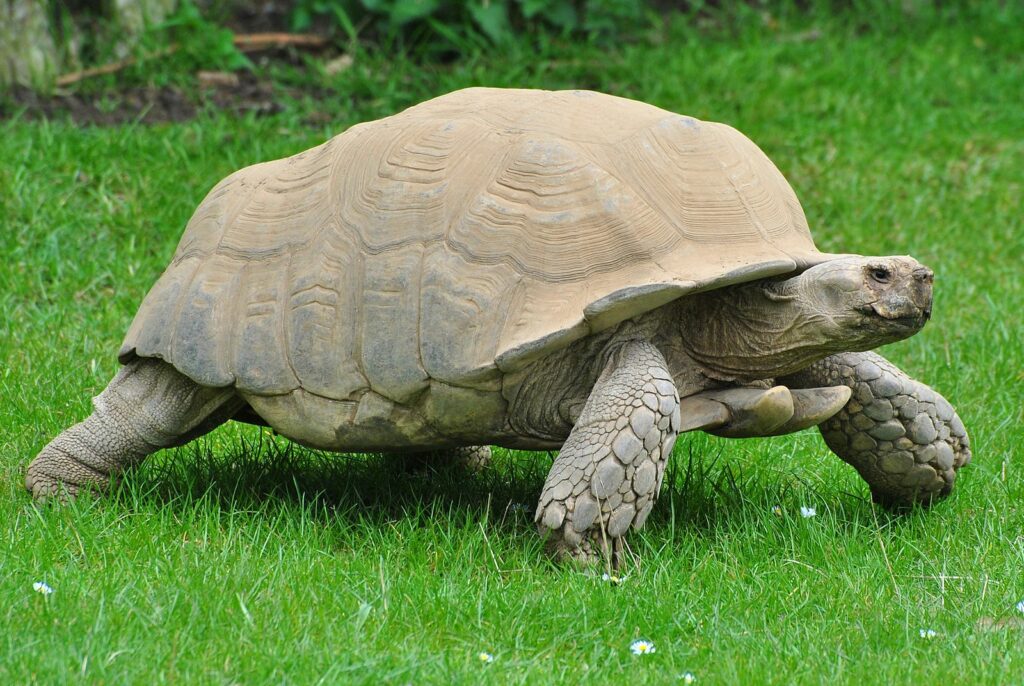
Image: Sulcata tortoise Wikimedia Commons CC 2.0
Sulcata Tortoises have a shell of a story to tell! They are one of the largest species of tortoises in the world. And they can live for a remarkably long time. Exceeding 100 years of age! Truly making them symbols of longevity and resilience.
These majestic creatures have been intriguing nature enthusiasts for centuries. Thanks to their sturdy shells and slow but steady movement. Plus, their extraordinary lifespan is attributed to their ability to adapt and thrive.
What sets them apart is not only their impressive size or long life, but also their lifestyle. They have a slow metabolism, which helps sustain their health for decades. Sulcata Tortoises spend a lot of time grazing on grasses and vegetation.
As we marvel at the remarkable lifespan of these ancient beings, let us consider the lessons we can learn from them. Their resilience and patience can be a reminder for us to embrace these qualities in our lives.
Key Takeaways
- Sulcata tortoises have a long lifespan, with some individuals living up to 70 years or more.
- The lifespan of a sulcata tortoise can be influenced by various factors, including diet, habitat, and overall care.
- Providing a proper diet that includes a variety of vegetables, grasses, and occasional fruits is essential for the health and longevity of sulcata tortoises.
- Creating a suitable habitat with ample space, proper temperature, and humidity levels is crucial for the well-being of these tortoises.
- Regular veterinary check-ups and proper healthcare practices are important to ensure the longevity of sulcata tortoises.
- Sulcata tortoises require a commitment from their owners, as they can live for several decades and require specialized care.
- Understanding the lifespan of sulcata tortoises can help potential owners make informed decisions about adopting or purchasing these reptiles.
Background information on Sulcata Tortoises
Sulcata tortoises, known also as African spurred tortoises, are large creatures that reside in arid regions of Africa. These tortoises can live for 50 to 150 years! They have a domed, hard shell to protect them from predators and tough weather.
These tortoises are herbivores, eating grasses and plants. They can grow up to 30 inches and weigh over 100 pounds. Males tend to be bigger, with more scales on their front legs. They have strong jaws to munch on vegetation.
Unique to Sulcatas is their ability to dig burrows. These are a form of defense against predators and temperatures. Plus, the burrows can hold rainfall, helping maintain moisture levels in the soil.
The oldest known Sulcata is Jonathan – living on St Helena Island since the 1800s and believed to be over 187 years old! He’s become a local celebrity.
If you want to find the age of a Sulcata tortoise, you’ll need to do some math! Calculator, whiteboard, and maybe a time machine – that’s all.
Lifespan of Sulcata Tortoises – Average lifespan and factors affecting it
Sulcata tortoises have an average lifespan that varies depending on many factors. Let’s explore the impact they have on the reptile’s life-span!
They need a balanced diet of grasses and plants to stay healthy. Additionally, the environmental conditions must be ideal, with carefully maintained humidity and temperature levels.
Also, providing proper healthcare is essential. Regular visits to a reptile vet can detect health issues and provide treatment before it’s too late.
Here’s a true story: Shelley, a Sulcata tortoise, celebrated her 75th birthday recently. She surpassed the average lifespan due to the best care from her compassionate family.
By following these tips, you can make your Sulcata tortoise live longer than your last iPhone’s battery life!
How to increase the lifespan of Sulcata Tortoises

Maximizing Lifespan of Sulcata Tortoises – Expert Advice!
Want to maximize the lifespan of your Sulcata Tortoise? Follow these 4 simple steps:
- Create a Suitable Habitat:
- Give them a roomy enclosure with proper heating and lighting.
- Include places to hide and areas to burrow.
- Feed Them Balanced Diet:
- High-fiber veggies, grasses, and weeds should make up most of their diet.
- Vitamin D3 and calcium supplements to prevent deficiencies.
- Maintain Good Hygiene:
- Clean up their enclosure regularly by removing waste and replacing substrate.
- Always keep fresh water for drinking and soaking.
- Regular Vet Visits:
- Schedule regular check-ups with a reptile vet.
- Consult a vet if you notice any signs of illness or abnormal behavior.
And don’t forget to protect them from extreme temperatures and provide mental stimulation. Following these guidelines will help ensure a long and healthy life for your Sulcata Tortoise. So, don’t wait anymore! Start taking action today!
Psst! Don’t forget to add strength training to your daily routine – you’ll need it to lift their heavy shells!
Common health issues and how to manage them
Ensure proper enclosure hygiene to prevent Shell Rot, by keeping the substrate dry and inspecting the shell regularly.
Nutritional deficiencies can be avoided by providing a balanced diet with leafy greens, veggies, and calcium supplements.
Regular fecal exams and deworming can control internal parasites and newly acquired tortoises should be quarantined before introducing them to other pets.
Maintain appropriate humidity levels and temperature gradients for respiratory infections, and seek immediate veterinary care if symptoms like wheezing or discharge occur.
Monitor the growth rate and ensure a well-balanced diet, along with proper UVB lighting and habitat conditions to prevent pyramiding.
Pneumonia can be avoided by providing a warm, clean, and stress-free environment; should your tortoise exhibit symptoms such as lethargy or appetite loss, seek immediate veterinary intervention.
Additionally, optimal temperatures should be maintained as extreme heat or cold can lead to health issues.
Lastly, regular visits to a reptile-experienced veterinarian will help detect any underlying health concerns promptly.
Time is of the essence if you want to ensure your Sulcata tortoise thrives; prioritize its healthcare needs and take action now to provide the best quality of life. Don’t let your beloved pet suffer any longer!
Frequently Asked Questions
1. How long do Sulcata tortoises live?
Sulcata tortoises can live for a very long time, with an average lifespan of 70 to 100 years. Some individuals have even been known to live up to 150 years.
2. What factors can affect the lifespan of Sulcata tortoises?
The lifespan of Sulcata tortoises can be influenced by various factors, such as diet, habitat, and general care. Providing a proper diet, maintaining suitable temperatures, and offering a spacious and enriched enclosure can help ensure a longer lifespan for these tortoises.
3. Do Sulcata tortoises require any special care to live longer?
While Sulcata tortoises don’t require any extraordinary care, they do have specific needs that need to be met for a longer lifespan. This includes providing a diet rich in fiber and calcium, maintaining proper humidity levels, and offering regular access to sunlight or UVB lighting.
4. Can the lifespan of Sulcata tortoises be impacted by their size?
Generally, the size of a Sulcata tortoise does not directly affect its lifespan. However, larger tortoises may have an advantage in terms of overall health and resistance to certain diseases. It’s important to note that proper care and a suitable environment are more critical factors in ensuring a long and healthy life for these tortoises.
5. What are some common health issues that may affect the lifespan of Sulcata tortoises?
Sulcata tortoises are susceptible to various health issues that can impact their lifespan. Some common problems include respiratory infections, pyramiding (shell deformities), shell rot, and nutritional deficiencies. By providing proper care, regular veterinary check-ups, and a suitable environment, many of these issues can be prevented or treated.
6. How can I ensure a long and healthy life for my Sulcata tortoise?
To ensure a long and healthy life for your Sulcata tortoise, it is crucial to provide a well-balanced and appropriate diet, a spacious and enriched enclosure, proper heat and humidity levels, regular access to natural sunlight or UVB lighting, and routine veterinary care. Regular monitoring of the tortoise’s health and addressing any issues promptly is also essential.
Conclusion
Sulcata tortoises have an amazing lifespan. These creatures can live for over 100 years! Their slow growth rate and ability to adjust to different environments give them such a long life.
They even outlive multiple generations of humans. As they age, they gain wisdom that is greater than ours! Seeing the passing of time gives them a unique point of view.
These tortoises also have incredible qualities. Their armored shells protect them from bad weather and predators. Their herbivorous diet lets them get all the nutrients needed to stay healthy.
References




